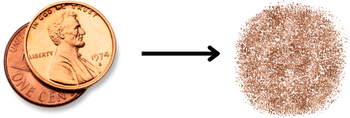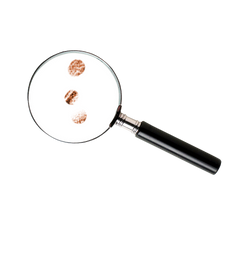Dust Wipe Sampling
Understanding Lead Dust Hazards
Lead dust forms when lead-based paint begins to chip, crack, peel or is otherwise disturbed. Lead paint chips and dust can get on surfaces and objects that people touch. Our inspectors use dust wipe sampling to determine if lead dust is present.
How Much Lead Dust Is Acceptable?
Lead dust found above standards during an initial inspection will result in a failure.
The Dust Hazard and Clearance Levels are 10 micrograms per square foot (μg/ft²) for floors and 100 micrograms per square foot (μg/ft²) for windowsills.
To visualize this, we’ll use a penny for comparison. A penny is 2 grams which equals 2 million micrograms. So, if we took just half a penny split into a million pieces it would look like this:
Half of a penny split into a million pieces looks like this.


Just ten of those tiny particles would cause a dust wipe failure on floors
The EPA offers guidance for homeowners to reduce exposure to lead dust. Per the EPA, it is especially important for property owners to:
- Maintain all painted surfaces in good condition.
- Clean frequently using a wet mop, cloth or sponge to reduce the likelihood of chips and dust forming.
- Use a lead-safe certified renovator to perform renovation, repair and painting jobs to reduce the likelihood of contaminating your home with lead dust.
- Find additional resources from the EPA here.
What Happens During a Dust Wipe Inspection?
Dust wipe inspections are required in municipalities with increased incidences of elevated blood lead levels in young children. Our NJ DCA Certified inspectors will take a moistened towelette and wipe surfaces throughout your rental. Then these samples will be sent to a lab for analysis. If the analyzed samples contain below the current hazard level, then a Lead Safe certification will be issued.
Lead Safe certifications are good for 3 years unless there is a tenant turnover after 2 years.
The Dust Wipe Inspection Process
- Our inspectors will need access to the interior of the rental unit. This includes any area of the home that the tenant can access such as hallways, basements and shared laundry rooms.
- Exterior areas such as porches are not part of the inspection.
- The technician will select four rooms from the dwelling unit to dust wipe with a focus on areas where children spend their time (bedrooms, living rooms and kitchen).
- The inspection report will be sent to the property owner 10 days after the inspection is complete. Reports can be expedited for an additional fee.
NJ DCA Certified Lead Evaluation Contractors
New Jersey’s new Lead Safe Certification Law requires that inspections be completed by the municipality or by a NJ DCA Certified Lead Evaluation Contractor hired by the town or the property owner.
LEW Environmental Services is a NJ DCA Certified Lead Evaluation Contractor, and all of our staff are properly trained and certified. You can access this list by clicking here.
Schedule Your Inspection